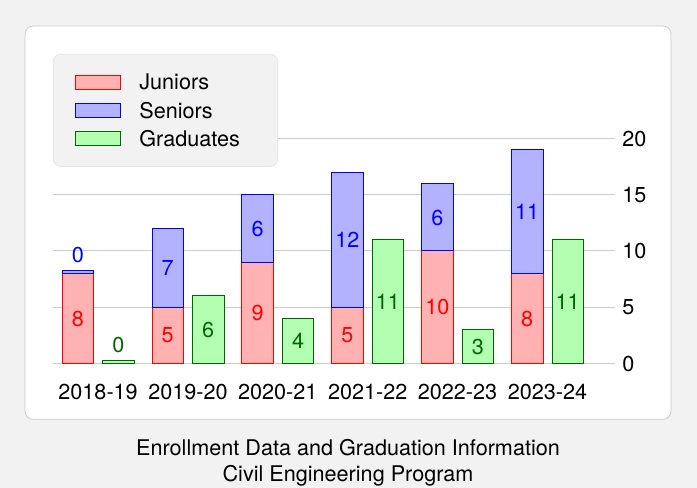The Bachelor of Science degree in Civil Engineering is offered at Colorado Mesa University through the CMU/CU Boulder Engineering Partnership Program and is delivered in its entirety in Grand Junction. Students take classes from faculty of Colorado Mesa University during the first half of the program and take engineering classes from faculty of the University of Colorado Boulder who reside in Grand Junction during the second half of the program. Students apply for admission to the University of Colorado Boulder during the second year of the program.
Students in the Engineering Partnership Program enjoy small class sizes, hands-on learning, and faculty who put teaching first. The curricula of the engineering partnership programs are modeled after the corresponding programs at the University of Colorado Boulder.
All first- and second-year students in the Engineering Partnership Program are assigned an engineering student mentor who provides 1:1 coaching on class registration, campus resources, and tips on what it takes to be a successful engineering student.
Students are required to take the Fundamentals of Engineering (FE) Exam before graduating. The FE exam is the first step in the process of becoming a professional licensed engineer (PE). It is designed for students who are close to finishing an undergraduate engineering degree from an ABET accredited engineering program.
View program requirements and track program in the CMU CU Boulder Partnership Program.
Academic Requirements for Bachelor of Science in Civil EngineeringWhat can I do with a civil engineering degree?
Civil engineers design and supervise the construction of the buildings and infrastructure that make up our world - roads, bridges, tunnels, skyscrapers, transit systems, water treatment facilities and offshore structures. They solve problems and meet challenges such as pollution, clean drinking water, climate change, energy and transportation needs, urban development and community planning.
Student Outcomes
In order to fulfill the Program Educational Objective, specific student performance outcomes must be met at the time of graduation. These Student Outcomes for the Partnership Program are:
- An ability to identify, formulate, and solve complex engineering problems by applying principles of engineering, science, and mathematics,
- An ability to apply engineering design to produce solutions that meet specified needs with consideration of public health, safety, and welfare, as well as global, cultural, social, environmental, and economic factors,
- An ability to communicate effectively with a range of audiences,
- An ability to recognize ethical and professional responsibilities in engineering situations and make informed judgments, which must consider the impact of engineering solutions in global, economic, environmental, and societal contexts,
- An ability to function effectively on a team whose members together provide leadership, create a collaborative and inclusive environment, establish goals, plan tasks, and meet objectives,
- An ability to develop and conduct appropriate experimentation, analyze and interpret data, and use engineering judgment to draw conclusions,
- An ability to acquire and apply new knowledge as needed, using appropriate learning strategies.
Accreditation
Students completing the Colorado Mesa University/University of Colorado Boulder Civil Engineering Partnership Program receive a Bachelor of Science degree in Civil Engineering from the University of Colorado Boulder. The Civil Engineering CMU/CU Boulder Partnership (Bachelor of Science) is accredited by the Engineering Accreditation Commission of ABET, https://www.abet.org, under the General Criteria and the Civil and Similarly Named Engineering Programs Program Criteria. Both Colorado Mesa University and the University of Colorado Boulder are accredited by the Higher Learning Commission.
Program Educational Objectives
The program objectives for the Bachelor of Science in Civil Engineering are that within five years:
- Graduates will be successfully employed in engineering, science or technology careers.
- Graduates will be assuming management or leadership roles.
- Graduates will engage in continual learning by pursuing advanced degrees or additional educational opportunities through coursework, professional conferences and training, and/or participation in professional societies.
- Graduates will pursue professional registration or other appropriate certifications.
- Graduates will be engaged in activities that provide benefit to communities.
Student Enrollment and Graduation Data
Enrollment data shown below are for the CU Boulder portion of the Engineering Partnership Program.

Curriculum
| Academic Year (AY) | Program Sheet | Curriculum Flow Chart |
|---|---|---|
| 2024-2025 | Program Sheet (24-25) | Curriculum Flow Chart (24-25) |
| 2023-2024 | Program Sheet (23-24) | Curriculum Flow Chart (23-24) |
| 2022-2023 | Program Sheet (22-23) | Curriculum Flow Chart (22-23) |
| 2021-2022 | Program Sheet (21-22) | Curriculum Flow Chart (21-22) |
| 2020-2021 | Program Sheet (20-21) | Curriculum Flow Chart (20-21) |
| 2019-2020 | Program Sheet (19-20) | Curriculum Flow Chart (19-20) |
| 2018-2019 | Program Sheet (18-19) | Curriculum Flow Chart (18-19) |
| 2016-2017 and 2017-2018 | Program Sheet (16-17, 17-18) | Curriculum Flow Chart (16-17, 17-18) |
Accepted CMU classes for CU Humanities and Social Sciences Electives
Contact Information
For more information contact Nathan McNeill, director of CMU/CU Engineering Partnership Programs, at 970.248.1623 or nmcneill@coloradomesa.edu
